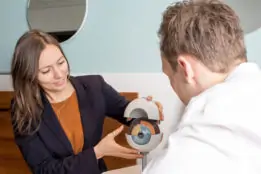Tips for Your Virtual Eye Exam Visit
As discussed in our earlier post Coronavirus and Your Eyes: Tips for Caring for Your Eyes, you may find yourself needing the care and advice of your eye doctor to discuss troubling eye or vision symptoms. If so, you might be able to take advantage of a virtual eye exam with your eye doctor. Virtual, or telemedicine, eye exams are done as a videoconference call through FaceTime, Skype or Zoom on your phone or computer and many doctors are offering this service during the COVID-19 pandemic. It allows you to remain safe at home while connect with your doctor to talk about your symptoms and figure out a care plan during these circumstances.

Telemedicine visits have been widely available for many years and is rapidly becoming a popular option for those who have difficulty getting into a doctor’s office. Many insurance companies offer coverage for telemedicine visits for treatment and advice, as it can sometimes help patients avoid going to urgent care or the emergency room, making it a cost effective as well as convenient option for care.
If you find yourself bothered by recent eye or vision symptoms, you may benefit from a telemedicine visit with your eye doctor. A virtual eye exam can be a great time to discuss your vision correction needs with your eye doctor, particularly if you’ve been thinking about moving on from glasses and contacts. There will likely be more time to talk through the risks and benefits of the various surgical options. To help make the appointment as productive as possible, we offer the following tips for using telemedicine for your next eye doctor appointment.
Call to Set Up a Virtual Eye Exam
- First, call your eye doctor’s office to see if they offer telehealth services.
- Make sure you have your insurance information on hand so the office staff can help determine what your coverage options are for telemedicine.
- There may be some forms you will need to fill out for the office before the visit such as an updated health history. Some offices offer an online form you can use, others may send you documents to fill out via email.
Ask About Technology
- What program does the practice use? FaceTime, WhatsApp, Skype, JoinMe, Zoom and Microsoft Teams are popular options, but there are also telemedicine-specific programs. Check with the office staff to decide if you need to download an app.
- Make sure your phone or computer and internet service is compatible with the technology requirements for your telemedicine visit.
- Spend some time learning how to use the video chat program before your appointment so you can focus on discussing your symptoms.
Prepare for Your Virtual Visit with Your Eye Doctor
- Pick a quiet, private place – you don’t want to worry about interruptions during your visit.
- Make sure the area has good lighting so your face easy to see
- Have a list of the medications you are taking – better yet, have the medications with you so you can show them to your doctor if needed.
- Have your pharmacy phone number and address on hand to make it easy for your eye doctor to call in a prescription if needed.
- It is also a good idea to have your insurance information as well as a credit card handy to take care of any co-pays or billing.
Importantly, make a list of any symptoms or concerns you have about your eyes or vision. It is normal to be a little nervous during a doctor exam – and particularly a new format such as a telemedicine appointment. Writing down your questions will help you make sure you talk through everything you need to with your eye doctor.
A Few Questions You Might Want to Ask During Your Telemedicine Visit
- What is my diagnosis?
- Do I need an in-person exam or any tests to confirm the diagnosis?
- How do I treat my symptoms?
- Do I need a prescription?
- When should I expect my eyes to feel or see better?
- When should I follow up with you?
And, Be Prepared to Answer Your Eye Doctor’s Questions
- What prompted this virtual eye exam?
- What symptoms do you have? How long have they been going on? Have they changed over time?
- What have you done to treat them so far? What are the results from treatment?
- Have you ever had these symptoms before? How did you treat them before?
- If you use glasses or contacts for vision correction, when was the last time you had a refraction?
On the Day of Your Telemedicine Appointment
- Be sure your phone or computer is charged.
- Have a pen and paper for taking notes.
- Have a thermometer and a flashlight handy in case the doctor needs you to take your temperature or get a better look at your eye.
- Have your glasses/contacts prescription available.
A virtual eye exam with your eye doctor can offer comfort and care for many eye problems, and a thoughtful discussion about your vision correction options, but it is important to understand that not every situation can be effectively managed remotely. Your eye doctor may recommend in-person treatment, either at the clinic or, in critical situations, an emergency care facility.




